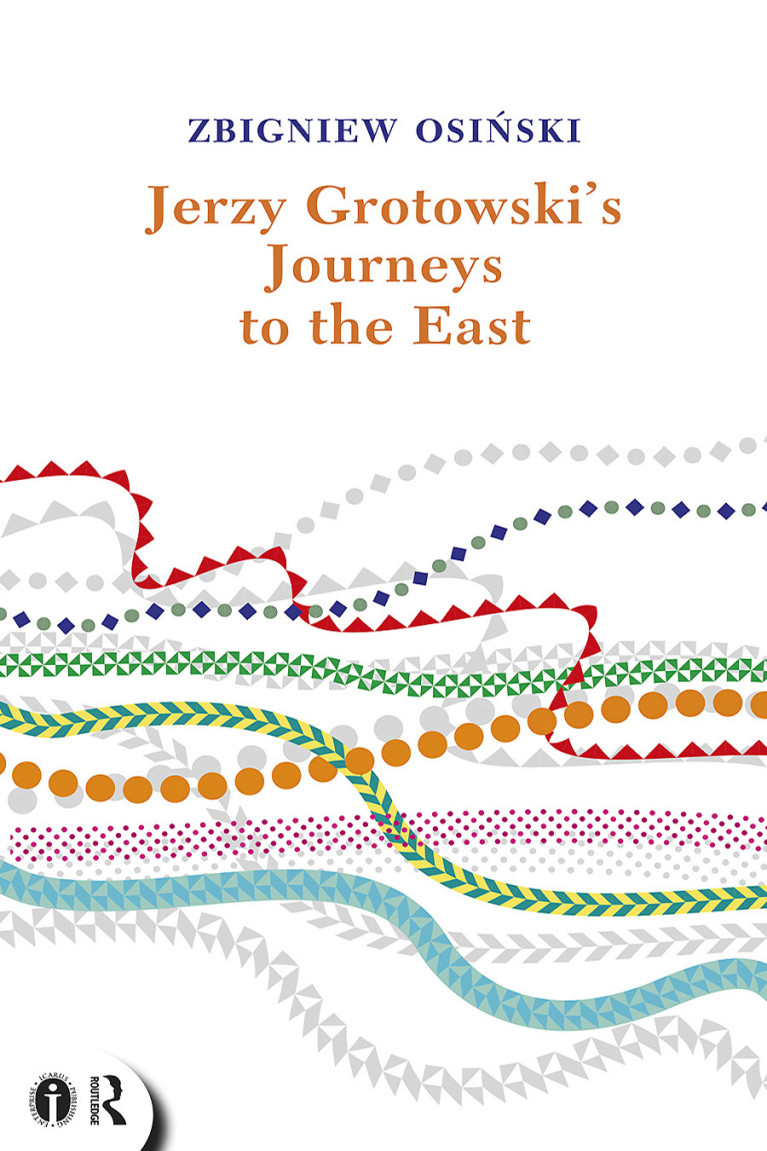- Autor: Zbigniew Osiński
- Przekład: Andrzej Wojtasik, Kris Salata
- Wydawnictwo: Routledge, Icarus Publishing Enterprise
- Data wydania: 2014
- ISBN: 978-1-138-77991-4
- Format: 135×215mm
- Liczba stron: 218
- Rodzaj oprawy: miękka
Jerzy Grotowski’s Journeys to the East
Zbigniew OsińskiPlease note that we ship only to addresses within Poland. If you want to order a book and have it shipped to an international address, email us at ksiegarnia@grotowski-institute.pl.
Translated from Polish by Andrzej Wojtasik and Kris Salata
Edited by Kris Salata
Polish text edited by Iga Rutkowska
Jerzy Grotowski’s Journeys to the East is an unusual scrapbook of facts, quotations, and commentaries documenting real and metaphorical journeys. Painstakingly researched by Grotowski’s biographer, a distinguished scholar of his work, it is necessary reading for those interested in Grotowski’s rich relationship with the East, but will also appeal to readers who would like to have a glimpse of the East from the 20th century Eastern European perspective – theatrical and otherwise. In that sense, the book opens a passage to the past, to the less known or forgotten pages of Polish theatre history, and to the lasting legacy of this most influential and enigmatic of artists. (an extract from the Editor’s Note)
Zbigniew Osiński (b. in Poznań in 1939 – d. in Warsaw in 2018) was a theatre scholar, Professor at the Faculty of Polish Studies at the University of Warsaw, and Professor at the Theatre Studies Department at the Aleksander Zelwerowicz National Academy of Dramatic Art in Warsaw. He was the originator, co-founder and first director of the Centre of Studies on Jerzy Grotowski’s Work and of Cultural and Theatrical Research in Wrocław, Poland, where he also served as Artistic and Research Director from 1990 to 2004. He has published extensively on the history, theory and anthropology of theatre.
His major works include: Grotowski and His Laboratory (1986); Grotowski wytycza trasy. Studia i szkice [Grotowski blazes the trails: Studies and sketches] (1993); Jerzy Grotowski. Od ‘divadla predstaveni’ k rituálnym hrám [Jerzy Grotowski: From theatre of productions to Ritual Arts] (1995); Jerzy Grotowski. Źródła, inspiracje, konteksty [Jerzy Grotowski: Sources, inspirations, contexts] (1998); Pamięć Reduty. Osterwa, Limanowski, Grotowski [The memory of Reduta: Osterwa, Limanowski, Grotowski] (2003); Polskie kontakty teatralne z Orientem w XX wieku, t. 1: Kronika, t. 2: Studia, [Polish theatre contacts with the Orient in the twentieth century; vol. 1: The chronicle, vol. 2: The studies] (2008); Jerzy Grotowski. Źródła, inspiracje, konteksty, t. 1: wydanie drugie zmienione, t. 2: Prace z lat 1999–2009 [Jerzy Grotowski. Sources, inspirations, contexts; vol. 1: second edition, revised; vol. 2: Works, 1999–2009] (2009); Jerzy Grotowski e il suo Laboratorio: Dagli spettacoli a L’arte come veicolo (2011); Spotkania z Jerzym Grotowskim. Notatki, listy, studium [Encounters with Jerzy Grotowski: Notes, letters, and a study] (2013).
The first traces of Grotowski’s fascination with the Orient can already be found in his childhood. His mother’s role in inspiring such interests was crucial. In Nienadówka, a village near Rzeszów, in south-eastern Poland, in spite of extremely difficult conditions under German occupation, Emilia Grotowska (1897–1978) would acquire books, assign them to her sons, and oversee their reading. A book that played a special role for Jerzy was Paul Brunton’s A Search in Secret India, whose translation by Wanda Dynowska was published in Poland shortly before the war as Ścieżkami jogów [On the paths of yogis]. This is how Grotowski described it to Andrzej Bonarski in 1975:
Mother went to town – she walked on foot, or she walked or rode with someone – anyway she brought back a book titled A Search in Secret India, written by an English journalist, Brunton. He talked about the people he met in India, mainly about some unusual man, who in our civilization would be called ‘yurodivy’. He lived on the slopes of Arunachala, a mountain considered as holy – the Mountain of Flame. His name was Maharishi. He had a peculiar custom. When someone came to him seeking an explanation about what is essential in life, how to bring meaning to life, or what is meaningful in general, [Ramana Maharshi] would ask him: ‘Who are you?’ But he would say it in the first person: ‘Ask yourself “Who am I?”’ (‘Rozmowa z Grotowskim’ [A conversation with Grotowski], interview by Andrzej Bonarski, Kultura, 13 (1975), 1, 12–13. An abbreviated version of the interview is available in English as ‘Conversation with Grotowski’, trans. by Bolesław Taborski, in Jennifer Kumiega, The Theatre of Grotowski (London: Methuen, 1985), pp. 217–23).
Considering that 50% of all books in translation worldwide are translated from English, whilst only 6% are translated into English, Odin Teatret (Denmark), the Grotowski Institute (Poland) and Theatre Arts Researching the Foundations (Malta) have created Icarus Publishing Enterprise, whose purpose is to present texts by artists and scholars in English translation about the practice and vision of theatre as a laboratory.
Icarus was the name of a schooner that sailed from Civitavecchia in 1697 with a cargo destined for a Venetian merchant resident in the international trading port of Smyrna. Its mythological name was intended, paradoxically, as a bringer of good luck, to ward off shipwrecks. In its hold, the small vessel also carried a luxurious curtain never used before, a few painted scenes and a number of scripts and musical scores from a theatre erected in Rome by Queen Cristina of Sweden and torn down on the order of Pope Clement X.
Similarly to that schooner, Icarus Publishing Enterprise wants to ferry into international waters writings of theatre artists and scholars who, despite their value, risk a limited circulation because of the language in which they have been written. We know by experience that theatre studies are effective only if they succeed in piercing the wrappings of academic commonplaces and inspire those wishing to do theatre. Many think that the theatre has no future. This may be so. But one thing is certain: in the future there will surely be something that we are unable to imagine now, but that will be called theatre.




